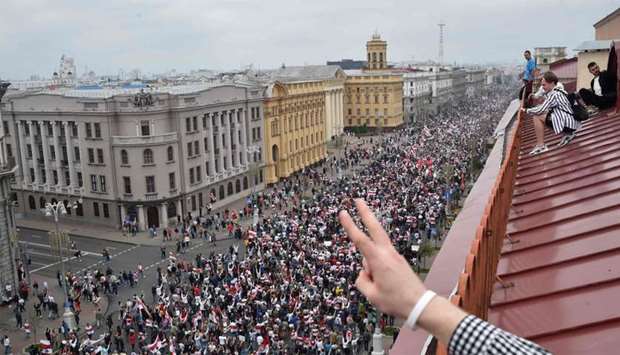Tens of thousands of demonstrators joined a rally against Belarusian President Alexander Lukashenko on Sunday, two weeks after a disputed election returned him to power.
Protesters gathered on Independence Square in the capital Minsk in defiance of threats from the state, shouting ‘Uchodi!’ - ‘Get out!’ Security forces had blocked many metro stations, forcing large groups of people to venture out on foot. The protests were peaceful.
The police however warned against participation in the unauthorised rally via loudspeaker announcements.
‘The holding of mass events is illegal, in case of participation we intend to hold you accountable,’ the Belarusian Interior Ministry said in a statement.
Ivan Kubrakov, head of Belarus' police force, warned people to stay away from the square.
The Defence Ministry meanwhile issued a stark warning: ‘If there should be disturbances of order or unrest in these squares, you will no longer have to deal with the [police], but with the army.’ The demonstrations come the day after Lukashenko ordered the military in the ex-Soviet republic to use the ‘most stringent measures’ to end attempts to overthrow his government, state media reported.
Lukashenko, 65, has led the former Soviet republic in Eastern Europe for a quarter century, tolerating little dissent.
Lukashenko said at a military base in the western Belarusian city of Grodno, near the borders of Poland and Lithuania, that foreign powers had been attempting to foment a revolution in Belarus, claims both Lithuania and Poland have stringently denied.
The runner-up in the election, according to the disputed official tally, Svetlana Tikhanovskaya, has fled to neighbouring NATO member state Lithuania amid the police crackdown on her supporters.
On Sunday she described the warnings as ‘the usual intimidation of the people.’ ‘It is a step that people in Belarus are already used to,’ she said in an interview with the BNS agency. ‘But Belarusians are no longer afraid and are ready to defend their rights. Nobody believes the president anymore.’

